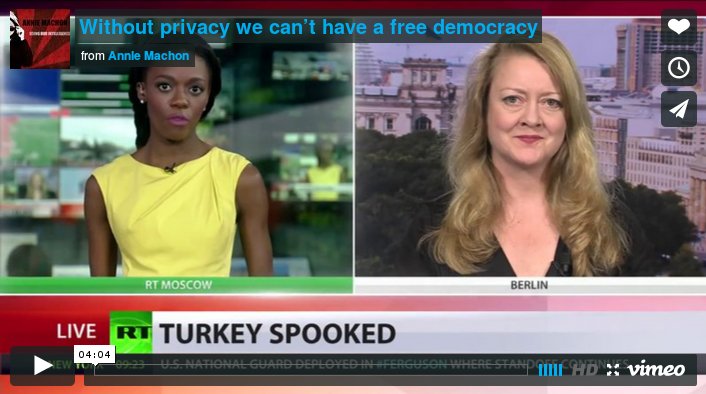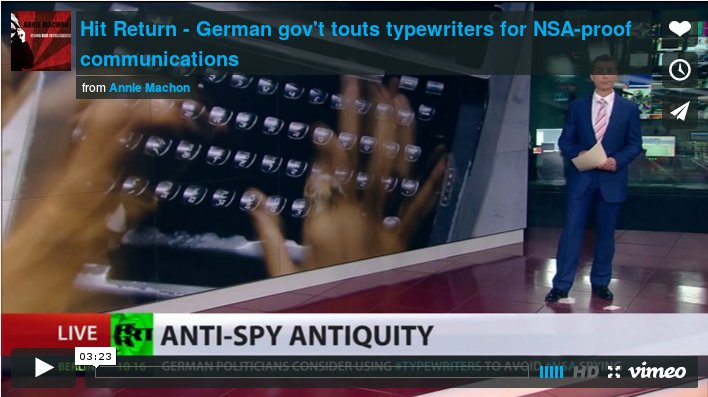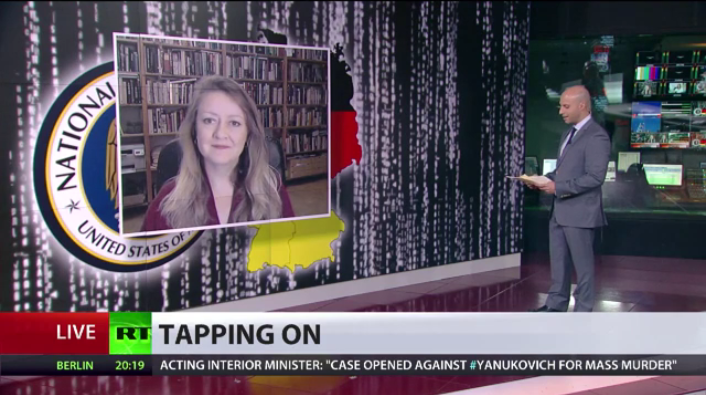First published on RT OP-Edge.
The ripple effects of the Donald Trump election victory in America continue to wash over many different shorelines of public opinion, like so many mini-tsunamis hitting the Pacific rim over the last few last weeks. The seismic changes have indeed been global, and not least in Europe.
First up, the Eurocrats have been getting in a bit of a flap about the future of NATO, as I recently wrote. In the past I have also written about the perceived “insider threat” - in other words, whistleblowers — that has been worrying governments and intelligence agencies across the Western world.
Currently the Twittersphere is lighting up around the issue of “fake news”, with Western mainstream media (news purveyors of the utmost unsullied probity, naturally) blaming Trump’s unexpected victory variously on the US alt-media shock jocks, fake news trolls and bots, and sovereign-state media outlets such as the Russian RT and Sputnik.
In the wake of US Democrat claims that Russia was interfering in the election process (not a practice that the USA has ever engaged in in any other country around the world whatsoever), we now have the US Green Party presidential candidate apparently spontaneously calling for recounts in three key swing-states in the USA.
The German government has already expressed concern that such “fake” news might adversely influence the almost inevitable re-election for a fourth term as Chancellor, Angela Merkel. Despite having been proclaimed the closest partner of the USA by President Obama on his recent speed-dating visit to Europe, and perhaps wary of the rising nationalist anger (I hesitate to write national socialist anger, but certainly its ugly face is there too in the German crowd) Merkal is getting in an electoral first strike.
At a slightly more worrying level, the European Parliament on 23 November voted for a resolution to counter “propaganda” from Russia — and incredibly equated that country’s media with terrorist groups such as ISIS — the very organisation that Russia is currently trying to help crush in Syria and which the West and NATO are at least officially opposed to.
Equating the content of licensed and networked media outlets — however much they may challenge Western orthodoxies — to the horrors of ISIS snuff videos seems to me to be wilfully blind if not downright and dangerously delusional. Or perhaps we should just call it propaganda too?
Whatever happened to the rights of freedom of expression enshrined in the European Convention of Human Rights? Or the concept that a plurality of opinion encourages a healthy democracy?
In America too, we have had reports this week that Google and Facebook are censoring alleged “fake” news. This is the start of a very slippery slope. Soon anyone who dissents from the orthodoxy will be deemed fake and disappear into the corporate memory black hole. Google in 2014 suggested a precursor to this, the Knowledge Vault, a search system that would promote approved websites and disappear those deemed inaccurate at least by Google algorithms. But who controls those?
Once again our corporate overlords seem to be marching remarkably in time — almost a lock step — with the mood of the political establishment.
So how did this all kick off? With remarkably prescient timing, in October the arch-neoconservative UK-based think tank, the Henry Jackson Society, published a report entitled “Putin’s Useful Idiots: Britain’s Right, Left and Russia”. Well, at least it got its apostrophes right, but much of the rest is just so much hate-filled bile against those who call out the failed Washington Consensus.
The Henry Jackson Society is an odious organisation that was founded in Cambridge eleven years ago. One of its initial signatories was Sir Richard Dearlove, former head of the UK’s foreign intelligence agency MI6, and of some personal notoriety for peddling the lies about Iraq’s weapons of mass destruction that took the UK into the disastrous and illegal Iraq war in 2003, as well as feeding in the fake intelligence about Iraq trying to acquire uranium from Niger that US Secretary of State Colin Powell used as a justification for the same war at the United Nations.
Despite all this, he remains happily retired, bloated with honours, while at the same time threatening the British establishment with his full memoirs to posthumously preserve his reputation and avoid prosecution for a breach of the Official Secrets Act, as I have written before.
The Henry Jackson Society has also folded into itself an organisation called the Centre for Social Cohesion — apparently established to build better integration for the Muslim community in the UK, but which for the last decade has done nothing but stir up Islamophobia. As others have written, the phrase “modern McCarthyites” might not be stretching this concept too far. And now it seems to be turning its ire against Russia.
Its emphasis has been unrelentingly anti-Islam for many years, so it was interesting that this establishment-embedded Society had a fully-formed report about the renewed Red Menace subverting our Western media just ready and waiting to be published ahead of the US elections.
So where does this all leave us?
It may well be that Facebook will begin to disappear so-called fake news — which could have repercussions for all the activist groups that, against all advice and common sense, continue to offer up their plans/organise events on that medium.
We may see the same censorship on Google, as well as dissident websites disappearing down the proposed memory-hole of the Knowledge Vault. Sure, such pages may be recorded on sites like the WayBack Machine et al, but who really searches through that reflexively? Most us us don’t even get through the first page of Google hits anyway. In our digital age, this will make the 20th century practice of your analogue dictator — the airbrushing of political opponents out of history — look positively quaint.
But, just as the Gutenberg Press was a radical innovation in the 15th century that led to a rapid spread of written ideas and the resulting censorship, repression and a thriving underground media, so the the current crackdown will lead to the same push-back.
Then we have to consider the potential censorship of state-owned news outlets such as RT, the Chinese CCTV, and the Iranian Press TV. Where will that leave other state-owned organisations such as the BBC, RAI and other international Euro-broadcasters? Oh, of course, they are part of the Western media club, so it’s all hunkey-dorey and business as usual.
But this can be a two-sided fight — only two months ago RT’s UK bankers, the state-owned Nat West Bank, announced that they were going to shut down the channel’s UK accounts, with no reason or redress. I gather that a similar threat was then issued against the BBC in Russia, and the case was quietly dropped.
Over the last 20 years I have been interviewed by hundreds of major media outlets across Europe, many of them state-owned. However, it is only when I appear on RT.com that I am accused of supporting a state-propaganda outlet, of being a useful idiot — and this has become increasingly marked over the last couple of years.
All these measures smack of an ill-informed and out-of-touch panic reaction by a hitherto complacent establishment. Before they attempt to airbrush history, we need to remember that history teaches some useful lessons about such elitist crackdowns: they never end well for anyone.




